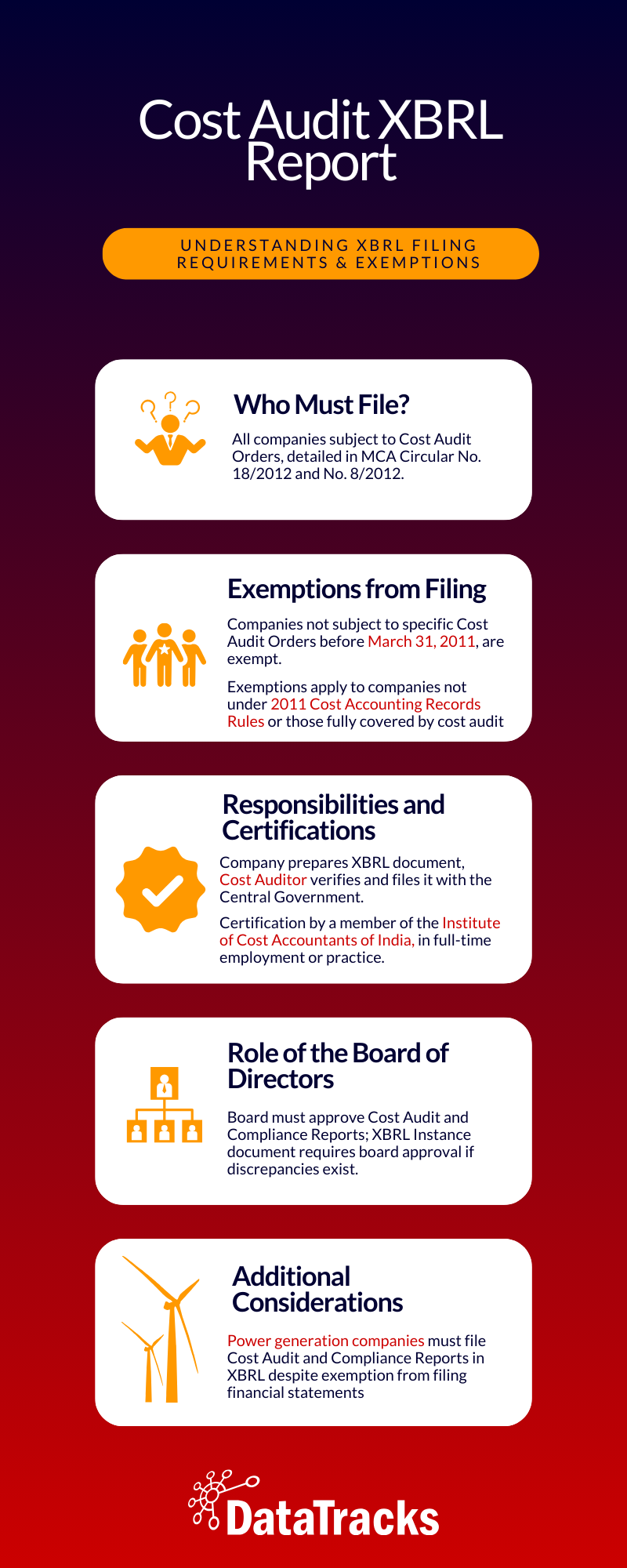All you need to know about Cost Audit & Cost Audit XBRL
What is cost audit XBRL?
Cost audit verifies cost accounts to determine the accuracy of cost accounting records. It is a means to ensure that cost accounting records are in track with the costing principles, plans, procedures and objective.
The audit usually involves
- Verification that costing records are accurate.
- Detection of errors in cost records
- Check the maintenance of cost books, accounts & records.
Who is required to keep “cost records” and conduct “cost audit”?
Section 148 of the Companies Act, 2013 lays out the provisions and requirements concerning Cost Records and Cost Audit applicability.
Rule 3 of the Companies (Cost Records and Audit) Rules, 2014 identifies the companies who are required to keep Cost Records, undergo a Cost Audit, and submit Cost Audit Report, in two separate sections defined by
- Table A , which covers regulated sectors dealing with specified goods/services and
- Overall annual total turnover from all products/services is INR 50 Crore or more.
- Aggregate turnover from the individual product/service is INR 25 Crore or more.
- Table B which covers non regulated sectors dealing with specified goods/services and
- Overall annual total turnover from all products/services is INR 100 Crore or more.
- Aggregate turnover from the individual product/service is INR 35 Crore or more.
However, companies covered by above rules are exempted from conducting a cost record audit if any of the following situations arise:
- The company’s export revenue in foreign exchange exceeds 75% of total revenue
- Company operates from a Special Economic Zone (SEZ)
- Company is engaged in production of electricity through Captive Generating Plant
Who does the audit?
Board of Directors, of qualifying companies, under Section 233-B of the Companies Act has to appoint a Cost Accountant to undertake the Audit and provide a report.
Every company must file notice of appointment of cost auditor with RoC through electronic mode in Form CRA-2 within 30 days of the board meeting in which appointment is made, or within 180 days from date of commencement of financial year.
What is a Cost audit report?
The cost audit report is a certificate containing five paragraphs on fifteen specific points such as
- Cost accounting system and cost accounting records
- Inventory valuation
- Budgetary control system
- Related party transactions
- Payments default to the Governments / Banks
- Actual exports, Export benefits, and incentives on their profitability
- Internal audit
- Suggestions in respect to cost control and cost reduction
- Independent audit opinion regarding the cost accounting records
After the audit is duly complete, report will be submitted in CRA-3 form by the auditor to the company. The company must then furnish the cost audit report, with full details and explanations to ROC electronically through Form CRA-4 along with digital signature of the Cost Auditor.

XBRL Filing Requirements – Cost Audit Reports
The Ministry of Corporate Affairs (MCA) has introduced a transformative requirement for companies and their cost auditors: beginning with the financial year 2011-12, Cost Audit Reports and Compliance Reports must be filed in eXtensible Business Reporting Language (XBRL) format.
This initiative is designed to improve the transparency, accuracy, and efficiency of financial reporting across various sectors.
Who Must File Cost Audit Report (XBRL)?
This filing requirement encompasses all companies that are subject to cost auditing under the Companies Act. Typically, this includes entities within manufacturing and mining sectors, where precise cost tracking and auditing are crucial for evaluating production efficiency and resource management.
Specific directives and the scope of applicability are detailed in various MCA circulars. Notably, Circular No. 18/2012 dated July 26, 2012, and General Circular No. 8/2012 dated May 10, 2012 [as amended on June 29, 2012], outline which companies are required to file their reports in XBRL format. For more insights into the evolution of XBRL reporting in India, you can read more at Journey of XBRL Reporting in India.
These documents are invaluable for companies to determine if they fall under the mandate and to understand the specifics of the reporting requirements.
Exemptions from Filing
Navigating the exemptions from filing requirements for Cost Audit Reports and Compliance Reports can be complex. Below, we outline which companies are exempt from these filings and under what conditions some exemptions apply.
Conditions Under Which Exempt Companies Must Still File a Compliance Report in XBRL Format
Companies that are not subject to the specific Cost Audit Orders issued prior to March 31, 2011, or those not falling under industry-specific Cost Audit Orders, are generally exempt from filing Cost Audit Reports.
These orders typically detail which industries and activities must comply, exempting others that do not meet these specified criteria.
However, there are conditions where exempt companies are still required to act. Even if exempt from filing Cost Audit Reports, companies meeting certain thresholds as prescribed in the Cost Accounting Records Rules of 2011 must file a Compliance Report in XBRL format.
This ensures that while exempt from detailed cost audits, these companies still maintain a level of transparency and accountability in their financial reporting.
Exemption from Compliance Report
Not all companies are required to submit Compliance Reports. Those not covered by any of the Cost Accounting Records Rules notified in 2011 are completely exempt from this requirement.
This exemption is designed to relieve companies with less complex operations or smaller scales from the burden of detailed reporting in the XBRL format.
Circumstances Under Which Companies Entirely Under Cost Audit Are Exempt from Filing Separate Compliance Reports
Companies whose entire product lines or activities are subject to cost audits do not need to file separate Compliance Reports.
This exemption applies because the detailed financial scrutiny in the cost audits covers the necessary transparency and compliance aspects that the Compliance Reports would otherwise address.
Cost Audit Report Responsibilities
Responsibilities of the Company and the Cost Auditor in the Creation and Filing of XBRL Formatted Cost Audit Report
The creation of the Cost Audit Report in XBRL format is primarily the company’s responsibility. It involves ensuring that all data is accurately represented according to the prescribed format and standards.
The company must compile and organize financial and operational data, which will be reflected in the report. Once created, the XBRL formatted Cost Audit Report must be approved by the company’s board before submission.
The Cost Auditor, on the other hand, is responsible for verifying the accuracy and completeness of the report. After approval from the board, the Cost Auditor must digitally sign the report, thereby certifying its compliance with regulatory standards and its accuracy.
The final responsibility of filing the report with the Central Government also lies with the Cost Auditor, ensuring that the document submitted is the final, verified version.
Certification Requirements
Who Can Certify the XBRL Filing of the Compliance Report: Qualifications and Employment Conditions
The certification of the Compliance Report in XBRL format must be done by a professional who holds a valid membership with the Institute of Cost Accountants of India.
This individual can be either a full-time employee of the company or a practitioner holding a full-time Certificate of Practice. The certifier ensures that the report complies with the prescribed XBRL taxonomy and meets all regulatory requirements.
Certification Capabilities for Dual Membership Holders (Institute of Cost Accountants of India and Institute of Company Secretaries of India)
Professionals holding dual memberships with the Institute of Cost Accountants of India and the Institute of Company Secretaries of India, and who are full-time employees of the company, are eligible to certify the Compliance Report.
However, they must not serve in the role of a Company Secretary or Director in the same company to avoid conflicts of interest. This ensures that the certification process remains unbiased and adheres to strict governance standards.
Role of the Board of Directors
Board’s Role in the Approval of Cost Audit and Compliance Reports
The Board of Directors plays a critical role in overseeing the financial reporting process, including the approval of Cost Audit and Compliance Reports. Before these reports can be submitted in XBRL format, they must first receive approval from the board. This step is crucial as it confirms that the board agrees with the information presented and is accountable for the accuracy of the financial disclosures.
Conditions Requiring Approval of the XBRL Instance Document When Discrepancies Exist
In cases where the XBRL Instance Document contains data or information that differs from what the board had initially approved, a re-approval process is required. This situation might arise due to last-minute amendments or errors found in the final review of the document. The board must review these discrepancies and approve the final document before it can be filed. This ensures that all information filed with the government accurately reflects the company’s financial state and operational efficiency as endorsed by the board.
This structured approach to responsibilities and certifications ensures that the process of filing reports in XBRL format is thorough, transparent, and adheres to the highest standards of financial reporting and corporate governance.
Cost Audit Reports -Additional Considerations
Lead Cost Auditor Designation
When consolidating audit reports across various segments or subsidiaries of a company, it is often practical to appoint a lead cost auditor. However, it’s important to note that no separate appointment process is necessary for this designation. Any of the existing auditors can be designated as the lead for consolidation purposes. This simplifies the process and ensures consistency in the audit approach and reporting.
Performance Appraisal Report
The Performance Appraisal Report is an essential document that provides a critical analysis of the cost audit findings relative to the company’s operational efficiency and cost management. This report should be submitted to the Board of Directors or the Audit Committee for review. However, it is not required to be filed with the Central Government, thus limiting its circulation to internal stakeholders who use the insights to improve business processes and strategies.
Sector-Specific Requirements
For power generation companies, there is a unique consideration concerning the filing of financial statements. While these companies are exempt from filing their Balance Sheet and Profit & Loss Account in XBRL format due to the absence of a finalized taxonomy under the Electricity Act, 2003, they are still required to file Cost Audit and Compliance Reports in XBRL format. This ensures that despite the exemptions, there remains a level of oversight and transparency concerning their cost structures and efficiencies.
What is the deadline for filing Cost Audit XBRL report?
The Cost Audit Report in form CRA-3 must be submitted by the Cost Auditor to the Company within 180 days of closure of financial year. The company must file form The CRA-4 to MCA within 30 days from thereon.
Adherence to the MCA’s XBRL filing requirements is more than a regulatory compliance measure—it is a strategic imperative that enhances financial transparency and operational accountability. Companies covered under these mandates, as well as those benefiting from certain exemptions, need to understand the specific requirements and implications of these rules. Proper compliance not only helps in maintaining good corporate governance but also aids in improving overall financial management.
For companies seeking assistance with XBRL filings for MCA, DataTracks offers robust support and expertise. DataTracks streamlines the process, ensuring that your financial reports meet the compliance standards efficiently and accurately, thereby allowing your company to focus more on its core operations and less on regulatory complexities.
Engaging DataTracks, who have expertise in handling various taxonomies across the globe and experience in handling turnarounds of less than a day, can help can help ease the stress of meeting filing deadlines without compromising on quality, and at competitive rates.
Write to us on enquiry@datatracks.in or contact us on +91 44 4208 1719 for a non-obligatory fee quote.
5 FAQs about Cost Audit XBRL
1. What is cost audit XBRL?
Cost audit XBRL is the process of submitting a cost audit report electronically in a standardized format called XBRL (eXtensible Business Reporting Language). This format allows for easier analysis and comparison of cost audit data by regulatory bodies and stakeholders.
2. Who is required to conduct a cost audit?
Companies meeting specific criteria outlined in the Companies Act, 2013 and the Companies (Cost Records and Audit) Rules, 2014, are required to conduct a cost audit. These criteria include exceeding certain turnover thresholds in specific sectors or for individual products/services.
3. Who conducts the cost audit?
A qualified Cost Accountant appointed by the Board of Directors of the company conducts the audit. The company must file a notice of appointment with the Registrar of Companies (ROC) electronically within specified timelines.
4. What information is included in the cost audit report?
The cost audit report covers various aspects of the company’s cost accounting system, including:
- Cost accounting records and procedures
- Inventory valuation
- Budgetary control system
- Related party transactions
- Internal audit
- Suggestions for cost control and reduction
- Independent audit opinion
5. What is the deadline for filing the cost audit XBRL report?
The Cost Auditor must submit the report to the company within 180 days of the financial year closure. The company then has 30 days to file the report electronically with the MCA through Form CRA-4 with the Cost Auditor’s digital signature.



